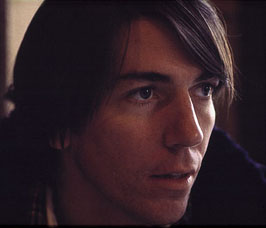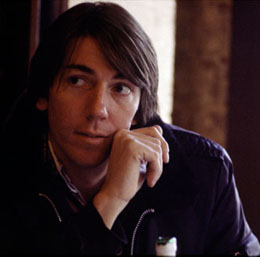|
||
|
Terence Boylan began his professional career in music at the age of twelve, when his band, The PreTeens, performed on WBNY’s Buffalo Bob’s Radio Show. Of some interest is the fact that the tune The PreTeens performed, Playing Hard to Get, a Buddy Hollyesque ditty with an ironic twist, was penned by Boylan at the age of eleven, thus foretelling a career in songwriting that would span over thirty years and produce such hits as Shake It, Don’t Hang Up Those Dancing Shoes, and Where Are You Hiding? Following a chance meeting with Bob Dylan in Greenwich Village in ’62, after which Dylan, Boylan and Ramblin’ Jack Elliot went to Izzy Young’s Folklore Center and traded songs for a long evening, Boylan returned to Buffalo, N.Y. with encouragement from his new hero, and began performing in many of Buffalo’s most popular coffee-houses, including The Limelight, The Lower Level, and the Bell, Book and Candle, in near-by Ontario. At that time, Boylan was still a sophomore in high school. He would describe the next two years as living in "excited confinement", knowing there was something out there that he desperately wanted to be part of. He managed to hitch-hike to both the Newport Folk Festivals of ’63 and ’64, where he performed at "The New Songwriter’s Concert", again made contact with Dylan, and also met blues legends John Lee Hooker and Mississippi John Hurt. At Bard College, in the Hudson Valley, Boona, as he was now becoming known, found himself right where he wanted to be – in a hot-bed of musical activity. He formed a band with his brother, John, The Ginger Men, playing in Greenwich Village’s Nightowl Café during summers and ‘field-periods’, and singing solo at hoots at NY’s famed Gaslight Café, the Village Gate, and Gerde’s Folk City. The NY Times’ Robert Shelton gave him a brief but laudatory mention following an appearance at the Village Gate, and the record companies started calling. Still working at The Niteowl, The Ginger men were busy fusing their folk and blues influences with contemporary rock ‘n roll, appearing there with other seminal bands such as The Flying Machine, led by the young James Taylor, The Blues Project, and The Lovin’ Spoonful, one of the first of the Nightowl groups to break into the top forty. After landing a solo contract with MGM/Verve Records, and before beginning a solo album, he recruited brother John for an experimental ‘rock meets theatre’ album. The duet, along with a dozen top studio musicians, recorded The Appletree Theatre in 1967, a ground-breaking effort among the so-called "concept" albums of the late sixties, fusing brief Saturday Night Live type comic sketches with slightly tongue-in-cheek parodies of contemporary musical genres. John Lennon, in an interview with Penny Nichols in London, called The Appletree Theatre one of his favorite new albums, Time Magazine lauded the Boylans' sense of humor, and Phillip Proctor acknowledged their influence on his own group, The Firesign Theatre. Returning to Bard College in ‘68, Boylan teamed up with fellow students Donald Fagen and Walter Becker, and recorded Alias Boona at New York’s Hit Factory, for MGM Records. In a tip of the hat to his old mentor, Boylan recorded an entirely re-arranged version of Dylan’s Subterranean Homesick Blues, sounding more like Procol Harem than early Dylan. The influence of The Band and Van Morrison were also evident on the album, in such tunes as Deep in the Middle and Hey Hannah. Dylan brought the album to the attention of manager Albert Grossman, and discussions began toward recording an album in near-by Woodstock, N.Y., then home to both Dylan and Grossman. But Boylan was on his way to the West Coast, to re-join brother John and the simmering Troubadour scene in Los Angeles. John Boylan was fast gaining a reputation as one of LA’s hottest young record producers, and was at that time rehearsing Linda Ronstadt with a new band he had assembled to back her on a coming tour. They would later become the Eagles, one of the most successful groups in recording history, and Ronstadt was launching her long and distinguished career as one of the preeminent song stylists of the last three decades. Meanwhile, old Bard friends Fagen and Becker were in town, having formed Steely Dan, and recording their first ABC/Dunhill album Can’t Buy a Thrill. Boona’s association with these two disparate groups of musicians would have a remarkable effect on his next album, but it would have to wait while he apprenticed as a production assistant for John’s Great Eastern Gramophone Company, and tour-assisted on several outings with many of that company’s recording acts. After writing and rehearsing an entirely new set of tunes, Boylan landed a recording contract with David Geffen’s Asylum Records, a famous stable of singer-songwriters that included Joni Mitchell, Warren Zevon, the Eagles, John David Souther and Tom Waits. Recording at LA’s Record Plant and Westlake Audio with members and musicians from both Steely Dan and the Eagles, Boylan merged different sensibilities into a stunning, lyrical, jazz-tinged rock album, with strong hooks and soaring harmonies, that went to number one on the Billboard National Breakout list the week it was released, and was the most added album at radio for five weeks straight. The level of writing and musicianship on Terence Boylan (Asylum 7E-1091) prompted a number of critics to hail it as "astonishingly brilliant", and the reviews were laudatory both in the US and abroad, winding up on a number of top ten lists at year’s end. Ian Matthews, a British singer, picked up on two of Boylan’s tunes for his album Stealin’ Home, and his version of Shake It quickly climbed to #4 on the Billboard Hot 100 charts. The following year, Boylan won two BMI Citations for songwriting. Following a fifty city tour with the Cate Brothers, Bonnie Raitt and Little Feat, Boylan settled in to Bearsville Sound in Woodstock, N.Y., and began recording a follow-up album. He actually wound up recording two albums, one an edgy and raucus take-off on the current punk rock movement, and the other a melodic and more sophisticated exploration of the genre he had successfully mined on the first album - heavily textured, mid-tempo songs with fresh, angular lyrics and seductive harmonies. At the last minute, it was decided to combine the two albums into one, Suzy (Asylum 6E-201) a move which may have confused radio programmers, who were unsure of which format the record fit. The critics picked up on the broad range in the album, however, and the reviews were excellent, but with less than full saturation at radio, the sales were disappointing. For those interested in hearing these songs in all their digitally re-mastered glory, a new CD, under license from Warner Brothers, was released by Spinnaker Records in June ’99. It combines the best of both of these albums plus a few new songs, and is available from Terence's web site, http://www.terenceboylan.com, and at Amazon.com.
|

